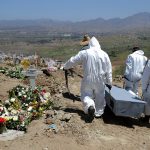Jose Mares is the Tijuana Logistics Coordinator for PHR partner Al Otro Lado, a legal services organization serving indigent deportees, refugees, and asylees in Mexico. Born in Mexico, Mares was brought to the United States when he was nine years old and lived there for three decades before being picked up by Immigration and Customs Enforcement (ICE) agents in early 2017 and deported. His daughter, mother, and all his siblings remain in the United States. Mares told his story during Physicians for Human Rights’ recent webinar on the impact of COVID-19 on refugee encampments in Mexico. The following is based on those remarks.
I was one of the first people to be deported by the Trump administration. This happened on February 9th of 2017, and I’ve been living in Tijuana ever since.
I was a single father of my 17-year-old daughter, whom I’ve raised since she was three-and-a-half years old. I was working as a tire salesman in Lancaster, California. That morning, my daughter drove me to work. Luckily, she didn’t see the six ICE agents that rushed me, put me in handcuffs, and pushed me into an unmarked van. This happened around 7:30 a.m.
“COVID-19 disrupted the lives of many people all over the world, but if you’re an immigrant, refugee, or a deportee living in Tijuana or Matamoros, it’s become a living hell.”
By 10:00 p.m., I was already in Tijuana. I had no court hearing and didn’t see a judge. I was picked up and deported the same day.
My daughter tried to keep up with payments for our house, but she was unable to and got evicted; she went from house to house until she was able to find a better-paying job. I attempted to cross illegally twice within the first three months of my deportation. I literally broke myself trying to get back home to my daughter.
When I first arrived in Tijuana, I was constantly harassed and threatened with jail by police because I didn’t have an I.D. Soon after I was deported, I connected with Al Otro Lado and started working with them. I was able to help other deportees obtain their documents and re-integrate back into society here in Tijuana. I have also worked with hundreds of refugees and immigrants since I started my job.
I have seen first-hand the mistreatment, the suffering, and the hardships that deportees, refugees, and immigrants face day to day, unable to receive even basic medical care, a safe place to sleep, or a warm meal to eat. The shelters in Tijuana are usually overcrowded, unsanitary, and unsafe. Things were already very hard for those stuck here – and then came MPP [“Migrant Protection Protocols”] and the pandemic.
Once MPP was implemented, it put an even bigger strain on shelters, organizations, and volunteers at border cities. Al Otro Lado set up MPP clinics in Tijuana and we provided housing for some families waiting for their court dates or for their number to come up on the infamous list of who gets to cross into the United States and present their case to U.S. border officials. We helped others with document translations and general support throughout their forced stay in Tijuana.
The pandemic put a hold on a lot of people’s lives around the world. Migrants and refugees who were fortunate to find employment started to lose their jobs; they faced eviction because they were unable to pay rent, and families started to go hungry with no food on the table. Al Otro Lado provided more than 200 prepaid debit cards with 4,000 pesos to clients, refugees, and migrants to help with basic needs for up to two months. Some medically vulnerable families were taken out of shelters and housed.
Government offices closed down because of the pandemic, so people being deported were not able to obtain any of the necessary documents like an I.D. or a birth certificate – and without those you can’t do anything in Tijuana. You also run the risk of being thrown in jail because you’re labeled as an indigent.
People in MPP are stuck along the border indefinitely. MPP courts are closed and so is the southern border, so even if they wanted to go home, they couldn’t. So, we then get whole families having to live in these shelters or tent cities with no end in sight.
COVID-19 disrupted the lives of many people all over the world, but if you’re an immigrant, refugee, or a deportee living in Tijuana or Matamoros, it’s become a living hell.

